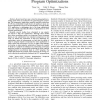Free Online Productivity Tools
i2Speak
i2Symbol
i2OCR
iTex2Img
iWeb2Print
iWeb2Shot
i2Type
iPdf2Split
iPdf2Merge
i2Bopomofo
i2Arabic
i2Style
i2Image
i2PDF
iLatex2Rtf
Sci2ools
115
click to vote
IPPS
2009
IEEE
2009
IEEE
A cross-input adaptive framework for GPU program optimizations
Abstract—Recent years have seen a trend in using graphic processing units (GPU) as accelerators for general-purpose computing. The inexpensive, single-chip, massively parallel architecture of GPU has evidentially brought factors of speedup to many numerical applications. However, the development of a high-quality GPU application is challenging, due to the large optimization space and complex unpredictable effects of optimizations on GPU program performance. Recently, several studies have attempted to use empirical search to help the optimization. Although those studies have shown promising results, one important factor—program inputs—in the optimization has remained unexplored. In this work, we initiate the exploration in this new dimension. By conducting a series of measurement, we find that the ability to adapt to program inputs is important for some applications to achieve their best performance on GPU. In light of the findings, we develop an input-adaptive optimization fram...
Distributed And Parallel Computing | GPU Program | GPU Program Performance | Gpu Programming | IPPS 2009 |
Related Content
| Added | 24 May 2010 |
| Updated | 24 May 2010 |
| Type | Conference |
| Year | 2009 |
| Where | IPPS |
| Authors | Yixun Liu, Eddy Z. Zhang, Xipeng Shen |
Comments (0)

